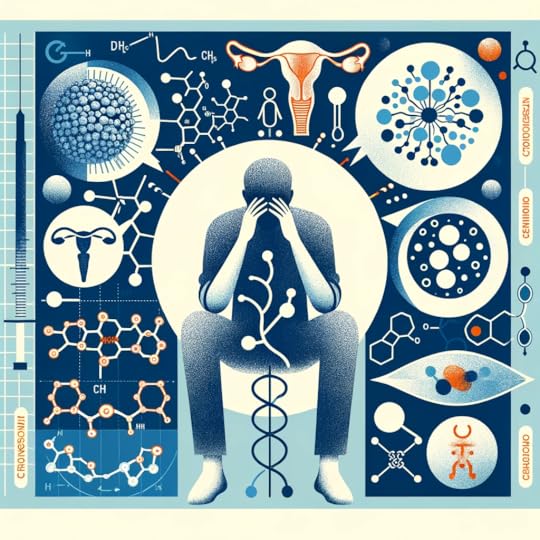Just Relax: A Myth
As someone who’s walked the long, often lonely road of infertility, I know all too well the rollercoaster of emotions it brings. It’s a journey marked by hope and heartache, endless doctor’s appointments, and an overwhelming sense of uncertainty. In this space, where we share our struggles and support each other, let’s debunk one of the most common yet misunderstood pieces of advice: “If you stop worrying about getting pregnant, it will just happen.” This well-meaning but often unhelpful suggestion deserves a closer look, both from a scientific and emotional perspective.
The Myth of ‘Just Relax’
How many times have we heard the phrase, “Just relax, and you’ll get pregnant”? While usually offered with good intentions, this advice can feel dismissive and hurtful. It implies that infertility is a result of not being relaxed enough, placing unfair blame on those already grappling with the complexities of this issue. The truth is, infertility is a medical condition, not a consequence of a stressed mindset.
The idea that simply relaxing can resolve fertility issues overlooks the multifaceted nature of reproductive health. This narrative can also lead to feelings of guilt and inadequacy, adding emotional weight to an already challenging situation. It’s crucial to acknowledge that while stress management is beneficial for overall health, it is not a magic solution for infertility.
The Science Behind Stress and FertilityUnderstanding the relationship between stress and fertility involves delving into the body’s response to stress. When stressed, our bodies produce cortisol, a hormone that prepares us for ‘fight or flight’. While this is beneficial in short bursts, chronic stress can disrupt normal bodily functions, including reproductive processes.

Studies have shown that high levels of stress can affect the menstrual cycle and ovulation, which are key components of fertility. However, it’s important to note that reducing stress is not a cure for infertility. Many couples with infertility issues experience stress due to the condition itself, creating a challenging cycle. While stress reduction techniques like mindfulness, yoga, or therapy can improve overall well-being and potentially have a positive impact on fertility, they are not standalone treatments for infertility.
It’s a delicate balance: acknowledging that stress can have a role in reproductive health, without oversimplifying or downplaying the complexities of infertility.
Medical Causes of InfertilityInfertility is a complex medical issue with a variety of potential causes. It’s essential to understand that it’s often not something within our control, and it’s certainly not a result of failing to ‘relax’. Common causes include polycystic ovary syndrome (PCOS), endometriosis, issues with sperm quality or quantity, and hormonal imbalances, among others. Each of these conditions requires specific medical attention and cannot be resolved simply by reducing stress.
Seeking help from fertility specialists is crucial. These experts can diagnose underlying health issues and offer treatments such as medication, in vitro fertilization (IVF), or surgery, depending on the specific problem. It’s important for anyone struggling with infertility to know that there are medical avenues to explore that can offer hope and solutions, far beyond the simplistic advice of just ‘not worrying about it’.
Personal Journey and InsightsOn a personal note, my own journey with infertility was a rollercoaster of highs and lows. Each negative pregnancy test was a blow, each sympathetic yet misguided piece of advice a reminder of my struggle. I learned that while well-meaning, the suggestion to ‘just relax’ can feel isolating, as if the difficulty lies not in a medical condition, but in a personal failing.

What I found helpful was building a strong support network. Connecting with others who understood my experience was invaluable. We shared our stories, our tears, and our triumphs, creating a space of genuine understanding and empathy. Additionally, finding activities that genuinely brought me joy and relaxation helped. Whether it was yoga, reading, or long walks, these were not cures for infertility but ways to care for my mental health during a challenging time.
It’s essential to recognize our emotional needs during this journey and seek support, be it through counseling, support groups, or leaning on loved ones. Remember, it’s okay to feel a range of emotions and it’s okay to seek help.
In our journey through the complexities of infertility, it’s vital to remember that simple solutions like “just relax and it will happen” don’t capture the reality of what we’re facing. Infertility is a medical condition, not a result of our actions or emotions. While managing stress is beneficial for our overall well-being, it’s not a cure for infertility. The road to parenthood, for many of us, involves medical consultations, treatments, and a deep well of strength and resilience.
To my fellow travelers on this path, know that your feelings are valid, your struggles are real, and your resilience is admirable. You’re not alone in this journey. Together, let’s continue to support and uplift each other with understanding, compassion, and hope.
 newest »
newest »




For years, I struggled with PCOS irregular periods, weight gain, acne, mood swings, and the emotional toll that came with it. I tried conventional treatments, birth control, diets, workouts, some helped a little, others left me feeling worse. It felt like I was fighting a silent battle with my own body. Then, someone recommended me to a herbal doctor. At first, I was skeptical. But something in me said, what do I have to lose? So I took a leap of faith and it turned out to be the best decision I ever made. The herbal doctor didn’t just treat my symptoms, he listened. He took the time to understand my body, my story, and crafted a natural, plant-based remedy specifically for me. Within a few weeks, I started noticing changes, my cycle started to regulate, my skin cleared up, my energy returned, and for the first time in a long time, I felt balanced.
It wasn’t just the herbs, it was the holistic approach, the belief in healing from the inside out. My journey isn’t over, but today I stand stronger, healthier, and more in tune with my body, thanks to the power of natural healing and the care of a gifted herbal doctor. If you’re dealing with PCOS and feel like you’ve tried everything, don’t lose hope. You can also reach out to the herbal doctor via email: poweroflovespell@gmail.com
WhatsApp: +2349117814268